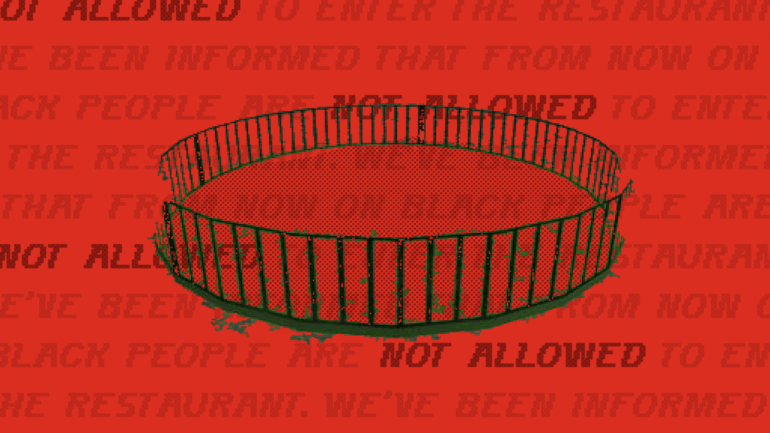Read the statement in Chinese (Simplified and Traditional).
Under racial capitalism, the COVID-19 pandemic has given rise to a series of racist incidents worldwide, scapegoating Black communities, Muslims, and ethnic minorities for carrying or spreading the virus. China is no exception: its heavy-handed campaign, aimed at controlling the pandemic at all cost, has disproportionately targeted undocumented migrants and residents of African descent, who were stigmatized as a high-risk population. We are witnessing a dangerous tendency in which anti-Black sentiments have become entangled with government action and facilitated large-scale ostracization of African communities.
We write this statement in response to incidents in Guangzhou in April 2020 where hundreds of Africans were denied services and evicted from their homes after rumors started that African migrants were a source of rising COVID-19 cases. As a result of local community support, international outrage, and the coordination of African and Chinese governments, these residents have started to be re-housed. However, we recognize that this treatment of Africans in China is part of a larger system inherited through colonialism, imperialism, and the extraction of goods from poorer countries to satiate the appetites of global capital. These structures of racial capitalism are connected across China, the US, and the world. It is a framework under which we can understand the exploitation of Black and African communities not as isolated incidents, but as interconnected practices of subjugation in the name of resource domination and extraction, and economic dependency.
The Belt and Road Initiative, China’s global infrastructure and development program, has long focused its attention on Africa. For their part, countries such as Angola, Djibouti, and Kenya have welcomed these generous offers of external financing for sorely needed infrastructure projects such as transport and housing. But debt is still debt—a capitalist imposition that entrenches colonial relations. In recent years, $2.56B in Chinese debt sent Congo into the arms of the IMF while Zambia, wracked by COVID-19, alleges that Beijing is demanding mining assets as collateral for debt relief. Here, Chinese imperialism is a wolf in sheep’s clothing, touting the benevolent rhetoric of development while exploiting resources and labor to increase Chinese capital.
How do we build Black-Asian solidarity and combat racism in an internationalist context? We condemn the xenophobic individuals in China who evicted African migrants based on false information and rumors. We need to amplify the actions of Chinese mutual aid organizers who faced arrest and questioning to bring food to African communities in isolation, and reject the conflation of Chinese people with the Chinese state. We must be vigilant in recognizing Chinese imperialist ventures, and strive to build alternatives grounded in worker solidarity, condemning Chinese imperialism and US imperialism alike. In particular, the racialized division of labor that has accompanied international development projects calls for a focus on worker solidarity across borders to resist abusive labor conditions. Indeed, resistance in Kenya and Gambia against oppressive working conditions and environmental degradation surfaced last year.
The explosive outbreak is showing no signs of subsiding, and incidents of anti-Chinese and anti-Asian xenophobia across the world have by now been well-documented. Rather than identify capitalism as the cause for crumbling healthcare infrastructure, lack of critical safety supplies and negligent crisis response, many have simply pinned the blame on Chinese and Asian people. Racist scapegoating isn’t new, but racist violence has long been deadly for Black and Indigenous people in and beyond the US.
The recent white supremacist murder of Ahmaud Arbery and the police slaying of Sean Reed and Breonna Taylor continue to reverberate. In the course of this pandemic, Black and undocumented communities have experienced intensified surveillance, harrassment, persecution, and exponential risks of infection in a carceral state that has always seen fit to profit from prisons. Led by a white nationalist President and a Republican majority in power who would rather use this pandemic to bail out corporations, the uneven ways that communities have experienced COVID-19 demonstrate just how much racial capitalism has molded economic, social, and political realities in this country.
As leftists, we reject global anti-Black racism and call on our communities to fight for Black lives against racial capitalism. Join us in challenging anti-Blackness as it shows up at home; to support anti-racist mutual aid efforts; to expand anti-imperialist efforts for mutual liberation. Anti-Asian sentiment may abate as the virus becomes contained, but Black people will still be barred from the privileges we enjoy through the ongoing institutionalization of anti-Black racism. Now is the time for creating, expanding, and strengthening international solidarity, thereby building power for Black, Asian, and all workers.
Sign up here to receive more information on future webinars and discussions on challenging racism, global racial capitalism, and building solidarity in the US and around the world.
Further reading
- Open letter from Freedom Inc.’s Southeast Asian Team on COVID-19 and Black Solidarity
- A Lost ‘Little Africa’: How China, Too, Blames Foreigners for the Virus by April Zhu
- Me and Bruce Lee would like to have a word with you by W. Kamau Bell
- Cheng Yinghong. “From Campus Racism to Cyber Racism: Discourse of Race and Chinese Nationalism.” China Quarterly (2011)
- Barry Sautman. “Anti-Black Racism in Post-Mao China.” China Quarterly (1994)
- Gordon Matthews, Linessa D. Lin, and Yang Yang. The World in Guangzhou: Africans and Other Foreigners in South China’s Global Marketplace (2017)
- Robeson Taj Frazier. The East Is Black: Cold War China in the Black Radical Imagination (2015)
- 严海蓉, 沙伯力 (Yan Hairong and Barry Sautman). 《中国在非洲:话语与现实》(China in Africa: Discourses and Reality). 北京:社会科学文献出版社, 2017.




